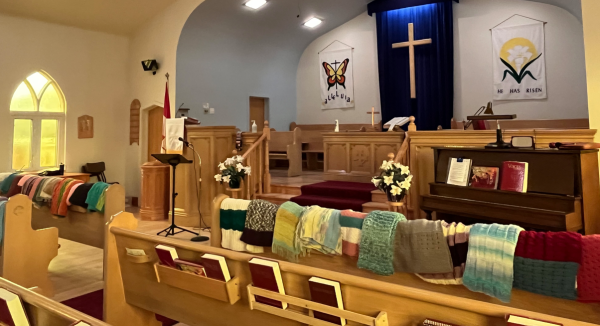Rice is Heaven
Colossians 1:15-18 / Luke 24:28-32
May 7th, 2023 / Fifth Sunday of Easter / Asian Heritage Month
* This sermon is attributed to Rev. Dr. Hyuk Cho, Ordained Minister of United Church of Canada and Professor of Vancouver Theological School.
In Korea, the traditional morning greeting is “Have you had breakfast?” Later in the day, the greeting changes to “Have you eaten?” Korean people ask all the time about whether someone has eaten. The greeting can be formal and polite or casual and more intimate, much like “How do you do?” or “Hello?” in North America.
When Asian people gather together for a meal, along with other dishes they usually share a bowl of rice since rice is the most widely consumed staple food for Asian people. Even as we human beings are all different, so is rice—different in length, shape, colour, texture, and aroma. But beyond the differences, there is one commonality in rice—it gives life. For more than half of the people in the world, rice is life.
The Korean poet Kim Ji-Ha says in his poem, “Rice is heaven; 밥은 하늘입니다.” The poem, frequently used as a grace at meals, goes like this:
Rice is heaven, / Because heaven cannot be possessed by one /Rice must be shared with each other.
Rice is heaven. / Just as together we view the stars in Heaven, / Rice must be shared by all.
When rice is eaten / Heaven enters the body.
Rice is heaven. / Ah-ah! Rice must be shared!
This poem reflects Asian people’s holistic thinking of life as interconnected or interdependent. Heaven, earth, and human beings have to work together to produce a bowl of rice. A bowl of rice on our table is the collaborative work of heaven’s sunshine, cloud, rain, and thunderstorm, of earth’s nurturing embracement and of human labour. A bowl of rice embodies heaven, earth, and human labour.
For East Asian people, rice is an embodiment of peace. The word, peace in Chinese, Japanese, and Korean is the same, which means “eating rice (和) together equally (平)”. Since rice is such an embodiment of our interconnected, interdependent life, it is supposed to be shared together. Since “heaven cannot be possessed by one” alone, “Rice must be shared with each other.”
In Paul’s letter to the Colossians, Jesus is presented as an embodiment of God’s wisdom to his followers to empower those who are living under a realm of domination. Jesus is a sacrament of God’s presence. For Asian people, eating rice is a sacred act. When I was young, our meal tables were rather serious: Laughing and joking were not allowed. In a bowl of rice there is the universe—the people’s joy and tears—an endless chain of work. So, eating rice is a sacred act.
In one post-Easter story in Luke, two of Jesus’ followers and a stranger—we now know him as Jesus—are journeying from Jerusalem to a village named Emmaus. As they reach Emmaus, the stranger is about to leave them, but they say to him, in wonderfully evocative words, “Stay with us, for it is evening and the day is far spent.” They sit down at the table together, and the stranger takes bread, blesses it, breaks it, and gives it to them, and then, Luke tells us, they recognize him. When Jesus breaks the bread, the memory of him doing that with his disciples brings them to recognize him. They remember the meals with the crowds of people beside the lake and many more meals with the poor.
For Asian people, sharing meals has been a common ritual, particularly among agricultural societies. Some people in Korea see God’s ministry in farmers work. For this reason, the Korean Methodist Rural Ministry Network created a Creed for Farmers in 2001. The faith statement is as follows:
“We believe in God the Creator of life, the Lord of everything, in Jesus Christ who came to the world as the rice of life and was willing to share his body and blood, and in the Holy Spirit, the Advocate who fills every village in our land.
We believe that the Temple of God is both the soil that is the raw material for humans and the earth that embraces life, that God who saves every life makes life abundant through farmers’ sweat and the energy of nature, and that the faithful servants of God are the farmers who are making an effort to learn from the soil, to care for the earth, and to cultivate lives.
We remember the Word of God that the land is never defiled and no one should buy or sell the land, realize that the Kingdom of God is the rural community made by the people who help and serve neighbours’ quality of living and work, and believe that the true Communion is all meals eaten with the whole family after work.
We are looking at eternal life, a new heaven and a new earth in which the spirit of death disappears and the spirit of life revives everything while working with God in fields and farms. Amen”
In our sharing of meals together, there is peace. In our sharing of meals together, there is community. Whether a communal or an individual ritual, eating rice is a sacred act. So, the greeting in Korea, “Have you eaten?” is a helpful reminder that people are checking up on each other’s well-being. We are not alone, we are all connected—heaven, earth, and other human beings—in a sacred act. “Rice is heaven.” Thanks be to God. Amen.
At children’s time we learned the word for apple is Sa-kwa (sa-wa) it also means “I am sorry. So when you hand a person an apple it could also be an apology. We all got a beautiful red apple, it is also a way of conveying that you care about someone.
Notices:
We welcome all those who wish to explore their faith to join us on Sunday Morning at 11:00 a.m.

The Prayer Shawl Group displayed the prayer shawls for blessing this Sunday. They were absolutely beautiful. They are available for those who are recovering from surgery, have become ill, or have a loss of a family member. All shawls have a blessing in them and are to give peace, comfort, and hope to those who receive them.
Bible Study with Lectionary: May 11th Thurs. At 1:30 pm in the Family room. Please feel free to join us. The readings are Acts 17:22-31, Psalm 66:8-10, 1 Peter 4:12-14;5:6-11, John 17:1-11
Thrift Shop was successfully completed once again. Thanks to everyone who helped with the setup and sales, shoppers, and to those who generously donated.
- Happenings at Wawa First United – February 13th - February 13, 2026
- Happenings at Wawa First United – February 4th - February 5, 2026
- Happenings at Wawa First United – Fourth Sunday after Epiphany - January 29, 2026
 Wawa-news.com Local and Regional News
Wawa-news.com Local and Regional News


